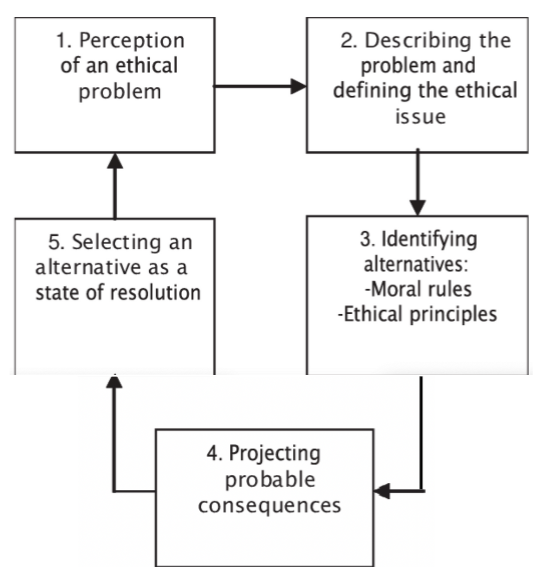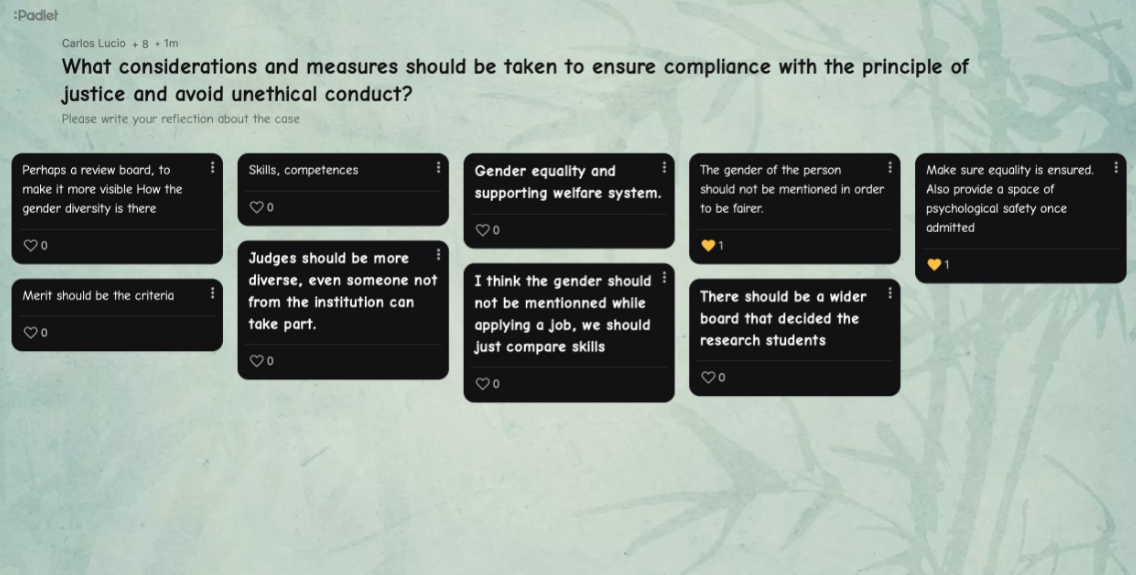Webinar 8
Created: 28.1.2023, Edited: 29.1.2023, Last Edited: 17.3.2023
In this webinar, two of my colleagues (C and T) demonstrated their competences.
C's session on Ethics
C's session was about ethics and began claiming that education is a moral and ethical activity that is heavily value-laden [1]. C then pointed out that perfect people do not exist and teachers are not an exception. Misconduct, corruption, fraud, illegal behavior, abuse of power and deception are considered unethical behavior [1] in contrast with honesty, integrity, and professionalism which are examples of ethical behavior [3].
C had an interactive moment where he asked us if we ever skipped some kind of formal training. I personally skipped some trainings when I was at Microsoft because my supervisor was confident I would manage. Here, at Karelia UAS, I got formal trainings like learning the safety issues related to the building infrastructure. In addition to this, I received more informal training from my colleagues on how to behave around students in different circumstances. In the beginning I did co-teaching together with my colleagues all the time, so, in my case, I think training was sufficient, but my colleagues' experience seems to differ which could be a source of stress.
We then discussed an example situation where a female applicant was ignored out of a fear of causing delays due to the fact that females are prone to becoming pregnant and asking for time off of work during maternity leave. These kinds of scenarios are unfortunately still a norm in many countries, luckily the situation in Finland is quite good.
C also introduce the code of conduct as a set of principles that provide some broad guidelines but is unlikely to provide answers to a complex multi-layered situation where there are competing responsibilities at hand. It is not as simple as choosing the 'right' option as opposed to the 'wrong' one [4]. C also pointed out we shouldn't idealize the profession and that there are some ethical dilemmas experienced by teachers in schools and universities arise from:
- Law and policies need to go beyond the law such as protecting a student from abuse in the home
- Administrative decisions conflicting with personal or professional ethics
- Student actions - ethic of care, behavioral issues, plagiarism
- Colleagues' actions such as discriminatory behavior in relation to students and to staff
- Tensions within professional ethics
He also gave an example of an ethical decision-making models (see Figure 1). Finally we had a collective reflection using padlet (see Figure 2).

Figure 1: Ethical-models

Figure 2: C's end-session Padlet
T's session on Safety
The next session was held by my colleague T and it had the topic of safety, similar as my colleague M, during the previous event in Oulu, therefore, many of the things were already discussed. However, there was some new information as well and I will try to focus on the additions and the differing viewpoints we got from T.One of these was the personal aspect of safety: someone could feel unsafe even though something doesn't pose a threat. We have to be understanding in these situations. Then, in the case of psychological-emotional safety, trained staff should be available to give crisis management. We learned about legal resources with information regarding safety. In addition to those already pointed out by M, there are:
- The Rescue Act [6]
- Act on Vocational Education [7]
- Universities of Applied Sciences Act [8]
- Student Welfare Act [9]
Teacher must know the instructions and regulations for protecting the student from violence, bullying and harassment [9]. The teacher must also know how to react in crisis situations and how to manage and organize aftercare [6]. The teacher has also information responsibilities such as, for example, data protection [7, 8].
From the student's point of view, pedagogical well-being includes issues similar to those of the teacher. In [11] it is suggested that renewal and involvement bring students wellbeing in the same way community offers wellbeing for teachers. In pedagogical well-being it is thought that it is central to support the student's growth and learning and removing the obstacles in their way so that students feel they have been truly encountered.
We then had an interactive discussion on how we would act in case of bullying, sudden illness, fire and information security risk. I believe bullying can often occur when students work as a team. I try to discourage that by saying that this is a simulation of their future working life and that not all co-workers are going to be friends. Practice treating everybody with respect and you won't have surprises later in life! In the case of sudden illness, we discussed about calling to 112, that we should always be aware of the address and how to give instructions to the ambulance team. We could rely on the help of other students to show the way to health professionals. Meanwhile, we should know the location of the nearest defibrillator and be able to give first aid if needed. In the case of fire, we should be able to make a quick decision if there is a chance to stop it using the nearest extinguisher or if should simply evacuate the premises using the nearest exit. Information security is a big problem, especially if an unofficial person (like a student) gains access to sensitive information (like other student grades or private information). Prevention is key: we should lock the computer every time we leave somewhere (for example: Win + L shortcut on a windows machine).
As a personal reflection I can add that we all experienced life as students and likely noticed our teachers acting in different situations like those described above. We, thus, have the information for how to act in these situations somewhere in our subconscious. However, the new generation is quite different and we need to be aware of what new threats exist (like cyber bullying). In addition to these more obvious threats, we should also be aware of less obvious ones, like the inability to focus for longer duration of time. With developments in technology and the internet, it is now possible to get quick access to any information we want (often this means entertainment). As a result, people tend to be inundated with new information all the time and have less time to reflect and… be bored, which is useful in and of itself:
I would also like to reflect on a question T addressed to all of us: If students have ample time in preparing for a task, however, they leave it for the last minute and then they are struck by some illness, should they be allowed to submit passed the deadline? In general, I would be strict in such a situation. Students need to learn that deadlines are a thing and not to be shocked when they encounter them in real-life. However, if the student in question has demonstrated to me in the past that they are hard-working and normally meets the deadlines, I can believe that they allocated time to solve the particular assignment on the last days because of many other ongoing projects. In this case I am willing to grant the student a favor. This action would be somewhat unfair to the other students in the group, however, as pointed out by C earlier, the situation is rarely black and white and ethical dilemmas do exist and this is one that I believe I handle OK.
One more topic I want to reflect upon is the development of artificial intelligence and automatic solving of homework assignments. Indeed, with the recent breakthroughs of OpenAI and Chat-GPT3 it is sometimes impossible to detect that an answer was automatically generated by a machine. This relates to answers written in natural language, but also to elements such as art and solving mathematical and algorithmic tasks. My advice to fellow teachers is to frame the questions to students in a way that the answer should include a personal experience and / or viewpoint, which are not so easy to reproduce convincingly by a machine trained to produce answers using a general model obtained from processing a lot of information made accessible online.
REFERENCES
- Hodgkinson, Christopher. Educational leadership: The moral art. State University of New York Press, 1991.
- Ehrich, Lisa C., Brian Hansford, and Lee Tennent. "Formal mentoring programs in education and other professions: A review of the literature." Educational administration quarterly 40, no. 4 (2004): 518-540.
- Kuther, Tara L. "A profile of the ethical professor: Student views." College teaching 51, no. 4 (2003): 153-160.
- Kidder, Rushworth M. How good people make tough choices. New York: Morrow, 1995.
- Lawton, Alan, Julie Rayner, and Karin Lasthuizen. Ethics and management in the public sector. Routledge, 2013.
- http://www.finlex.fi/fi/laki/ajantasa/2011/20110379
- https://www.finlex.fi/fi/laki/ajantasa/2017/20170531
- https://finlex.fi/fi/laki/ajantasa/2014/20140932
- https://www.finlex.fi/fi/laki/ajantasa/2013/20131287
- https://www.oamk.fi/emateriaalit/osaamisen-kehittaminen/turvallisuusosaaminen/lait-ja-dokumentit/
- Erkkilä, R. Perunka, S. (2021). Pedagoginen hyvinvointi voimaannuttaa ja osallistaa opettajan ja opiskelijan. OAMK Journal, https://oamk.fi/oamkjournal/2021/pedagoginen-hyvinvointi-voimaannuttaa-ja-osallistaa-opettajan-ja-opiskelijan/